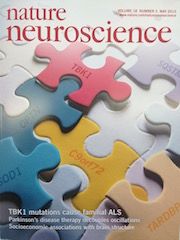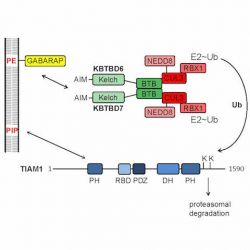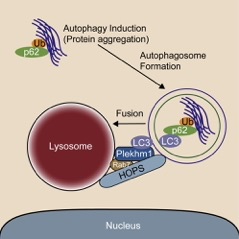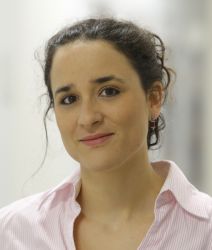News from the Institute

ALS (Amyotrophic lateral sclerosis ) is a devastating disease characterized by loss of motor neurons and neurodegeneration, usually leading to death within 3-4 years.
Despite being classified as rare disease, public awareness is very high, fueled by celebrity patients like Stephen Hawking and culminating in last years’ Ice Bucket Challenge, the first charity campaign with global impact. Still, there is no treatment for ALS, despite intensive research in the field.
Researchers from IBC2 and BMLS have now made a major step to a better understanding of the genes causing ALS.
... (read more)
The CEF Macromolecular Complexes approved funding for the proposal of Masato Akutsu, Christian Behrends, Vladimir Rogov and Volker Dötsch on the spatio-temporal regulation of protein complexes by the family of human ATG8 proteins.
By employing highly complementary structural, biophysical, biochemical and cell biological approaches this young team of researchers seeks to understand the role of the ubiquitin-like ATG8 proteins as reversible, membrane-bound scaffolds that help organizing protein and protein complexes spatially to control cellular pathways other than autophagy.
The research program is supported with 300.000 Euro for two years starting June 2015.
... (read more)
Spatio-temporal control is critical for RAC1 signaling. In this week’s online issue of Molecular Cell the group of Dr. Christian Behrends report the identification of CUL3-KBTBD6/KBTBD7 as ubiquitin ligase that locally regulates the abundance of the guanine exchange factor TIAM1.
Furthermore, membrane targeting of CUL3-KBTBD6/KBTBD7 is mediated by GABARAP proteins, thereby establishing functions of this subfamily of human ATG8 proteins beyond autophagy and membrane trafficking.
... (read more)
As reported in this month’s issue of Molecular Cell and Cell Host & Microbe, an international team of researchers led by Prof. Ivan Dikic has shed light on the molecular function of the protein PLEKHM1, that has previously been shown to regulate bone density in humans and rats.
The team has identified two novel functions for the protein that are important for human disease; firstly, facilitating the removal of toxic protein aggregates and preventing their accumulation, which is relevant for diseases such as Parkinson’s. Secondly, controlling the intracellular growth of invading pathogens such as Salmonella.
... (read more)
Alexandra Stolz, postdoctoral researcher at IBCII, received a grant from the Fritz Thyssen Foundation to fund her proposed project on targeting the autophagy system.
The research program is supported with 150.000 Euro over the next two years.
The Fritz Thyssen Foundation is an active supporter of basic science since more than 50 years, focusing especially on support for junior researchers.
... (read more)